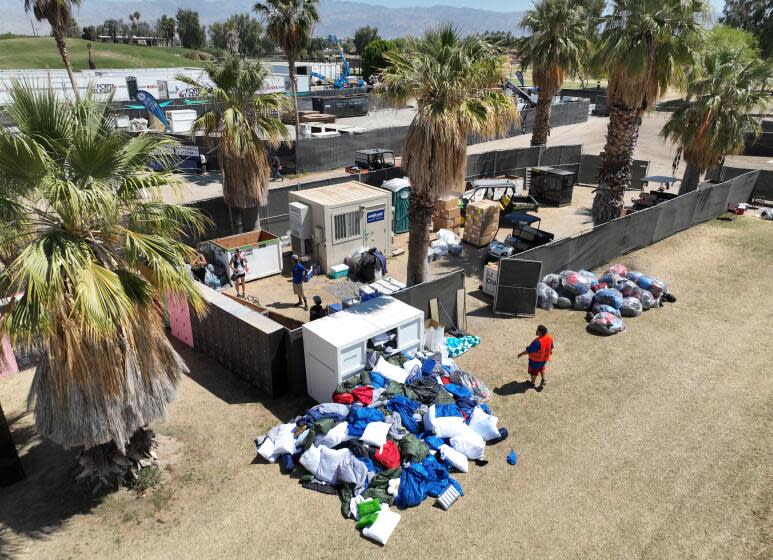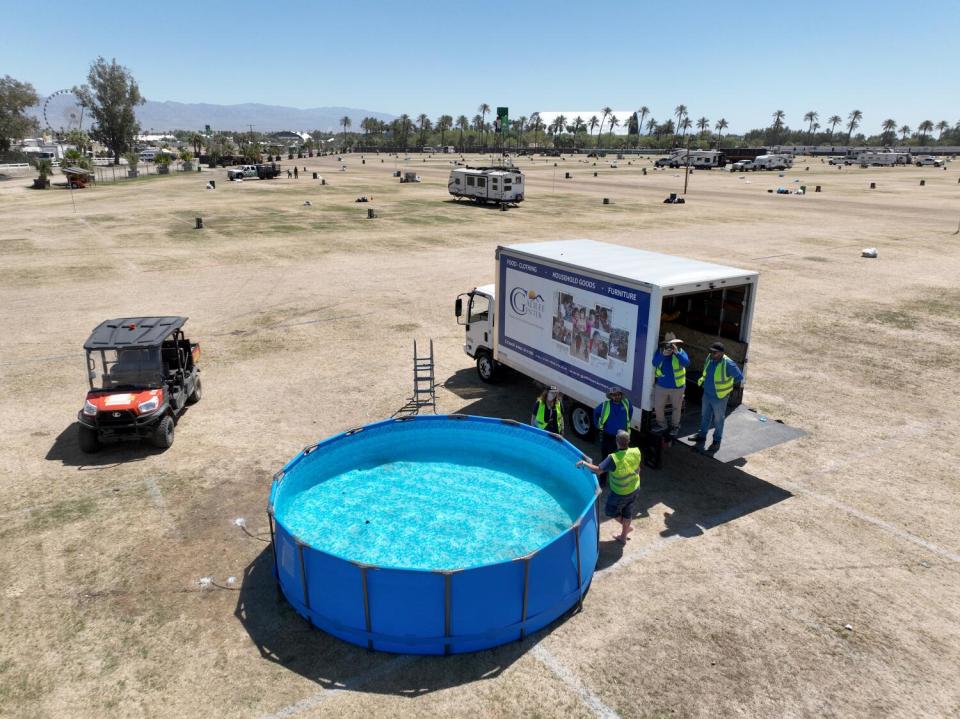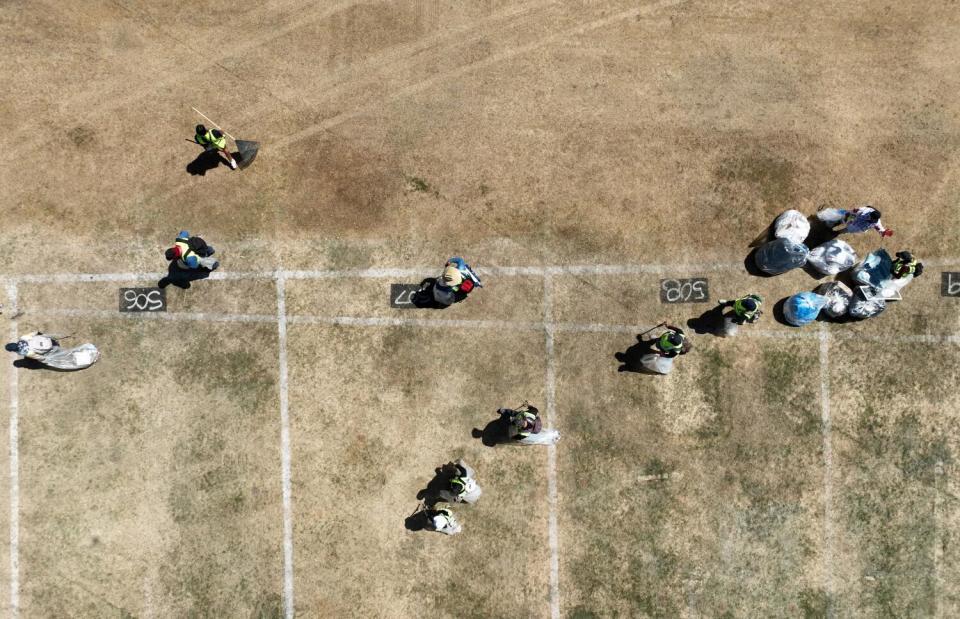Stagecoach and Coachella fans leave behind tons of camping gear, clothes, food. Here's what happens to it

Once music fans file out of the Empire Polo Grounds in Indio at the end of the Stagecoach and Coachella festivals, the work begins for charitable organizations who turn the discarded clutter — more than 24 tons of it strewn throughout the 642-acre property — into a benefit for the local needy.
Among the things left behind on the festival grounds are clothing, camping gear, dry foods and other goods that local community organizations pick up by the truckload to help benefit the low-income and unhoused people they serve.
Many out-of-town festival attendees leave behind folding tables or camping chairs because they fly into Southern California and purchase what they need for the weekend but can't carry the items onto a plane when they leave, said Lupe Torres-Hilario, director of operations at the Galilee Center, a nonprofit that fulfills food, clothing and basic needs for local disadvantaged children, families and farmworkers in the East Coachella Valley.

The Coachella Valley Music and Arts Festival ran April 12-14 and April 19-21. The Stagecoach Country Music Festival ran April 26- 28.
For the last five years, the Galilee Center has sent two trucks to the Stagecoach festival and four trucks to the Coachella festival the day after the festivities end. Volunteers and Galilee Center staff split up among the campsites to find left-behind items or ask attendees who are packing up their campsites whether they have anything to donate.
"When they do [want to donate] they sometimes hand us a canopy still open and we'll close it, pack it up and put it in our truck," Torres-Hilario said.
Read more: The differences — and similarities — between the Coachella and Stagecoach festivals
The festivals attract different types of fans: Coachella attendees rely primarily on tent camping and car camping while Stagecoach fans often arrive in RVs, she said. There are fewer discarded items after Stagecoach because people pack up their RVs and leave, Torres-Hilario said.
Galilee Center also often gets calls from event sponsors who want to donate tables, chairs and throw rugs.
This year, the center gathered 48,480 pounds of donations from Coachella. The total for items collected after Stagecoach hasn't been calculated yet.
Last year, Goldenvoice, the music festival promoter that puts on Coachella and Stagecoach, donated a total of 34.6 tons of materials from Coachella and Stagecoach.
Most of the donated items are put in the Galilee Center's thrift store to be sold; the proceeds go toward the organization's programs. The funds are used for programs that offer assistance with rent and utility bill assistance and to purchase items like diapers for infants, protein drinks for seniors and food to replenish the center's distribution program.
Clothing and furniture vouchers given to low-income individuals and families can be used at the center's thrift store to pay for items recovered from the music festivals. Left-behind cots and sleeping bags often are given to unhoused people for free, Torres-Hilario said.
"Some of it is trash and we throw it away, but for the most part, a lot of the stuff is in good condition that I could easily grab from Coachella and hand it over to a family in need," she said.

In addition to Galilee, nonprofit organizations that have partnered include Martha's Village and Kitchen and the Coachella Valley Rescue Mission.
Martha's Village and Kitchen serves unhoused and impoverished people in the Coachella Valley and Riverside County. The nonprofit gets calls for donation dropoff or pickup during and after the event, said Alexandra Vargas, its spokesperson.
Read more: Coachella and Stagecoach sound guy Dave Rat reveals the secrets to keeping the music crystal clear
When a client graduates from the organization's residential program into their own home, items from the thrift store can be used to furnish their house.
The Coachella festival also benefits the needy when music fans visit the Indio thrift story operated by Martha's Village and Kitchen during "Thrift-chella," an annual sale event that offers deals such as five pieces of clothing for $1.
Often festivalgoers who buy in bulk at the thrift store bring back items to donate that they didn't use during the festivals or can't take with them on on the way home.

"Things like that help us with our revenue because whatever we make from the thrift store, that funds everything we do," Vargas said.
Surplus food from the festivals also helps support charitable organizations. Each day of the festivals, the Coachella Valley Rescue Mission rolls a food truck to the festival grounds to pick up leftover food from all the food booths to be served as meals at the mission, said Scott Wolf, its development director.
"We serve anywhere between 700 and 1,000 meals a day here at the Rescue Mission, so the foods that are donated by Goldenvoice goes a long way to assisting us with serving those meals," Wolf said.
Read more: Why is Coachella headliner Doja Cat L.A.'s only female rap megastar?
Whether it's donations or "Thrift-chella," Vargas said she feels like the total amount donated to her group from the festivals has increased in recent years. She said she isn't sure if it's because of influencers spreading the word about the donations or it's just an increase in awareness.
"Throughout the years it's been more of a benefit for our community," she said.
Martha's Village and Kitchen's client population is 55% families and children who receive services such as daycare with a fee that's income-based, shelter and an emergency food pantry. Packaged food donations particularly help keep the pantry stocked, "especially because the cost of groceries has increased so much with inflation," Vargas said.
The donations are greatly needed, she said, because the lines at the food pantry have been growing longer over the past year.
This story originally appeared in Los Angeles Times.


